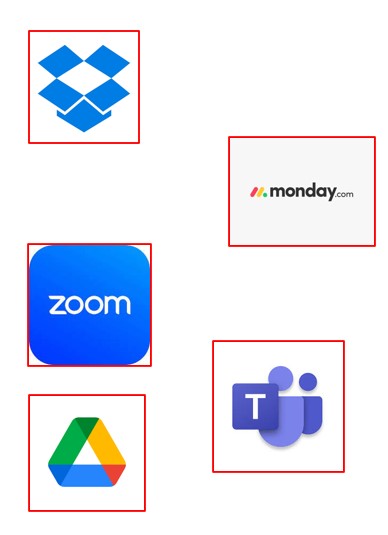Hybrid Work Teams for Rural Micro Enterprises
 Promoting Effective Teamwork in a Hybrid Work Model for Rural Micro Enterprises
Promoting Effective Teamwork in a Hybrid Work Model for Rural Micro Enterprises Hybrid working is a form of flexible working where workers spend some of their time working remotely (usually, but not always, from home) and some in the employer's workspace.
The Pandemic has transformed Hybrid work possibility
Virtual work structures and post pandemic Hybrid work structures has worked very well.
For the rural micro-enterprise it has opened up the national, and global labour market.
Rural Micro Enterprises are no longer disadvantaged in attracting and retaining the best staff.

Advantages of Hybrid work include;

• Improved productivity
• More scheduling flexibility
• A stronger work-life balance
• Time money and most especially personal energy savings on commuting
• Dramatically improved access to skills
• Money saved on office space
Disadvantages or Fears of Hybrid work include;

• Staff feeling less connected to the organization's culture
• Impaired collaboration
• Disrupted work processes
• Less recognition of job performance
• Productivity fears
• Resentment among the workforce obliged to attend the workplace in person more frequently
• Imbalanced role development/performance
Fair transparent leadership, reliance on ever-improving technologies and understanding that more effort is required to ensure the natural communications channels and coordination in the physical workplace are substituted for, go a long way in addressing any difficulties.
Face-to-Face Meeting and Office attendance
regular scheduled get togethers - ‘Anchor’ Days
Clear rules about workplace attendance
Ensuring that those who attend the office more frequently aren’t diadvantaged
Clearly explain and map out tasks and processes
In a hybrid work setting patterns of task completion may not be established
More scope for confusion which can be managed by closer attention to detail
Establish Clearcut ‘Rules of engagement’ for Communication
Hybrid/Virtual teams communicate less frequently
Communication Norms need to be clearly established.
E.g. Agreement on when to use different modes of communication

Establish Workplace Rhythm
In a traditional workplace, the rhythm of the working day come naturally.
This should be aspired to in the hybrid workplace.
Consciously Target Isolation
Combatting isolation is very necessary to enjoyable rewarding work.
Building in time for social contact
Use of collaborative software that allow for easy real-time discussion should be prioritised.
Encourage Boundaries
In rural micro-enterprises with more familiar relationships disengagement from work this is more difficult.
Clear written guidelines to ensure all staff can disengage at the appropriate time without guilt or disadvantage.
Track Commitment and Results
no easy way to observe engagement and productivity.
structures which track progress are very necessary.
Methodologies such as Objectives and Key Results (OKR) where targets are quantified
One-to-One Engagement
One-to-one performance management and mentorship interactions very important
 ICT Tools for Hybrid Management
ICT Tools for Hybrid Management
Dropbox
cloud based file holding service which can be synched across devices. Users can control access on Dropbox and work both online and offline.
Monday.com
Helps teams streamline their workflow, collaborate seamlessly, and manage complex projects. CRM, marketing, design, human resource etc.
Zoom
Online video conferencing platform
Microsoft Teams
In addition to video conferencing, Teams offers extensive virtual collaboration features, including Office 365 integration.
Google Drive
A cloud-based storage service that enables users to store and access files online as well as share files and work collaboratively online. Files created similar to Microsoft Office programs, WORD, Excel and Powerpoint.

This is specific to each organisation needs. Trial and Error measured through structured analysis and reflection is very necessary.

Essential to ensure that insight gained informs practice.
For new processes such as the embedding of ICT tools in support of Hybrid work it is especially useful.
It involves self-awareness, and continuous learning and growth
Elements of successful reflection include:
• Time to reflect
• Something to reflect upon
• Medium for capturing reflection
• Skills in reflection
• Honesty
• Feedback
Capturing reflection in written format in a Reflective Journal is essential.
E.g.
• What?
• So What?
• Now What?
In this scenario might be of best use in group format.
 Hybrid Working - Employer Obligations
Hybrid Working - Employer Obligations While there are differences in detail between jurisdictions in the European Union employers have a legal duty of care to their employees regardless of the location of their work.
Health and Safety
Employers are legally bound to ensure that employees are not at risk from long term Health and Safety dangers regardless of where they work. Here this may require;
Balanced agreement between Employer and Employee to agree on the resources and equipment required
Employers should be expected to contribute significantly to any costs incurred
The Right to Disconnect.
the right to disengage from work and not engage in work-related electronic communications during non-work hours.
Important that the rural micro enterprise is fully aware of legislation in their own jurisdiction.
In a rural micro enterprise this can be complicated by;
 Keeping Hybrid Teams Motivated
Keeping Hybrid Teams Motivated
In a workplace where employees may attend the office on a different basis motivation is complicated.
Fairness and all-inclusiveness for all staff play a key role in effective hybrid team management.
Proximity Disadvantage
Close proximity to the central workplace should not dictate decisions on hybrid work possibility
Where job function requires daily attendance, the employee should be fairly incentivized
Reward and recognition
More difficult to recognize achievement
Effective teamwork structure including a degree of mentorship and consciously taking time for recognition
Organised Work Schedules
Hybrid can easily become chaotic.
Uncertainly demotivating and a perception of unfairness can develop.
Shared daily work calendar and regular scheduled events or meetings
Shared Decision Making
In a rural micro enterprise staff appreciate opportunity to take part in decision making.
In many cases a shared decision is the only right decision.
Ensuring that Staff working on a hybrid or virtual basis are not excluded
 Summing up
Summing up
 |
•work practices have grown in popularity since the pandemic and will continue to grow into the future
•Hybrid work structures bring a lot of obvious Hybrid advantages but also some disadvantages which need to be carefully managed
•understanding that more effort is required to ensure the natural communications channels and coordination in the physical workplace are substituted for is vital.
|
 |
•Today a wide range of affordable and easy to use ICT tools to improve business and team management in hybrid/virtual work settings are available.
•The greater challenges lie in understanding when and how to use these tools and to ensure that their use is consistent across the organisation.
|
 |
• While there are differences in detail between jurisdictions in the European Union employers have a legal duty of care to their employees regardless of the location of their work.
•Health and Safety and ‘Right to Disconnect’ are important considerations
|
 |
•Motivation in a complex hybrid work environment can be very challenging in ensuring all employees regardless of work location are treated fairly. |
 Test Yourself
Test YourselfDigital team / Hybrid working / Digital tools for management/Reflective Practise/ Motivation
Objectives:
- That participants appreciate the challenges and opportunities of hybrid work for rural micro enterprises
- That participants are equipped with the knowledge and skills necessary to develop a rural micro enterprise hybrid work team model
Learning Outcomes:
At the end of this training the participant will:
- Be able to identify and value the potential rewards and opportunities offered by the rural micro enterprise Hybrid workplace
- Understand the challenges and possible solutions of managing small hybrid teams
- Recognize different digital tools for Hybrid Team Management
- Foster an appreciation of the value of reflective practice
- Have an awareness of the legal responsibilities of rural micro enterprise employers in relation to hybrid working
- Understand how motivation can be enhanced in rural micro enterprise hybrid work teams.
EQF
Level 4
DigiComp 2.2:
- - Information and data literacy
- - Communication and collaboration
- - Safety
- - Problem solving
Competence(s):
- Collaborating through digital technologies
EntreComp:
- - Ideas & opportunities
- - Resources
- - Into action
Competence(s):
- Valuing Ideas
- Mobilising Others
- Planning and Management
- Learning through Experience
-
Related training material
- Course. Leading and Managing Rural Micro Enterprises Through Digital Change






